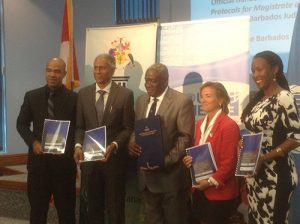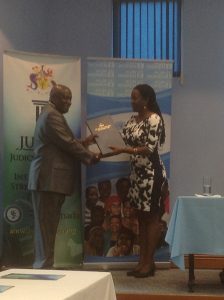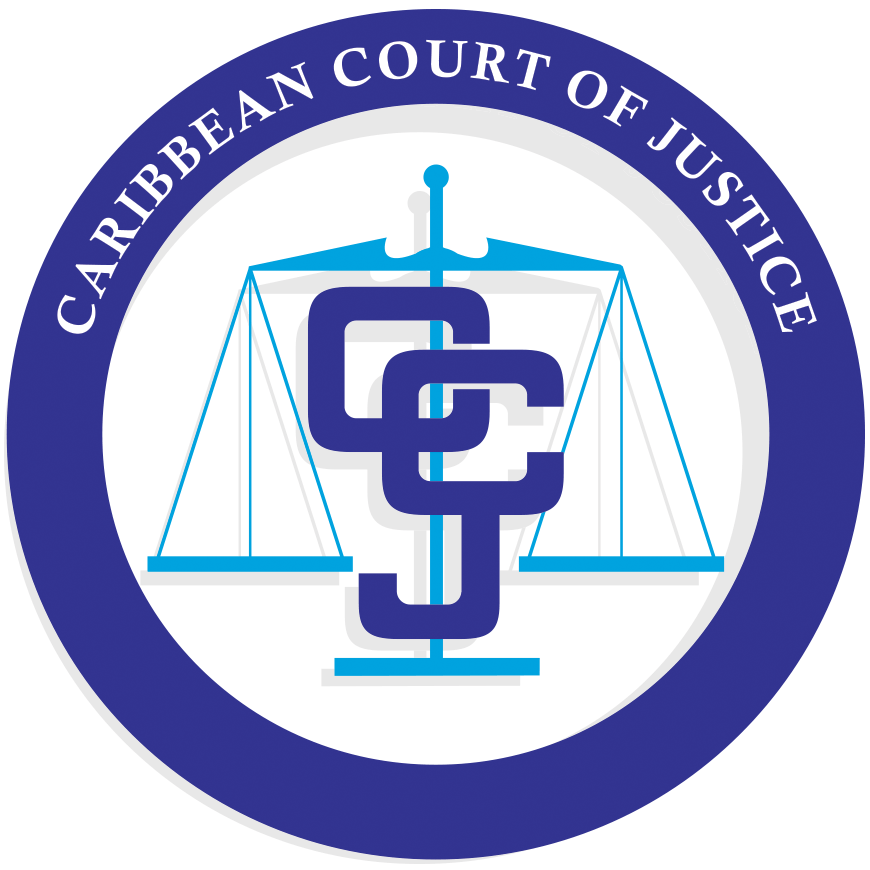 The idea of creating a Gender Protocol for Caribbean judicial officers has been in the making since 2015 when CAJO and UN Women collaborated at CAJO’s last biennial in Montego Bay, Jamaica to showcase a Gender Protocol for Mexican judges. On that occasion UN Women supported the participation of two members of the Mexican judiciary to attend the CAJO conference to share with the members of CAJO Mexico’s experiences in promulgating such a document. CAJO and UN Women subsequently undertook and arranged to create draft Gender Protocols for Caribbean judiciaries.
The idea of creating a Gender Protocol for Caribbean judicial officers has been in the making since 2015 when CAJO and UN Women collaborated at CAJO’s last biennial in Montego Bay, Jamaica to showcase a Gender Protocol for Mexican judges. On that occasion UN Women supported the participation of two members of the Mexican judiciary to attend the CAJO conference to share with the members of CAJO Mexico’s experiences in promulgating such a document. CAJO and UN Women subsequently undertook and arranged to create draft Gender Protocols for Caribbean judiciaries.
The judiciaries of Barbados and Trinidad and Tobago were selected in the first instance. UN Women hired two Interns, Farzad Idadi (who was assigned to Barbados) and Daren McLeod (who was assigned to Trinidad) to support the development of the drafts. These interns were selected on a competitive basis by a joint team from CAJO (Magistrate Lisa Ramsumair-Hinds and Justice Adrian Saunders) and from UN Women (Ms. Tonni Brodber Hemans). Having been selected, the interns were afforded access to the courts and to judicial officers by Chief Justice Gibson and Chief Justice Archie respectively. Under the supervision of CAJO and UN Women the interns produced rough drafts that were continually edited and refined by CAJO and UN Women until a polished draft was completed.
The project received the full support and assistance from the Caribbean Association of Women Judges and the Trinidad and Tobago Association of Women Judges of which Magistrate Ramsumair-Hinds was also a member. The JURIST project has also been heavily involved in this initiative not only through defraying a range of expenses associated with it but also in providing expertise and technical support through the instrumentality of Ms. Anika Gray who straddles both UN Women and JURIST. Ms. Gray and Ms. Sharon Carter-Burke (Communications Associate UN Women) played critical roles in the process of refining and completing the drafts. It is now expected that the judiciaries of Barbados and Trinidad and Tobago will examine the drafts and hopefully adopt and formally promulgate them with such amendments and adaptations as they see fit. This process will be replicated throughout the region. As Justice Saunders stated in his remarks, promulgation of the Protocol is the beginning and not the end of a process as the document must now be used as a judicial education tool to ensure that all judicial officers are fully conscious of the need to be gender sensitive. In the photograph Ms. Tonni Brodber Hemans of UN Women is seen handing over the Barbados draft to Chief Justice Marston Gibson.
the Trinidad and Tobago Association of Women Judges of which Magistrate Ramsumair-Hinds was also a member. The JURIST project has also been heavily involved in this initiative not only through defraying a range of expenses associated with it but also in providing expertise and technical support through the instrumentality of Ms. Anika Gray who straddles both UN Women and JURIST. Ms. Gray and Ms. Sharon Carter-Burke (Communications Associate UN Women) played critical roles in the process of refining and completing the drafts. It is now expected that the judiciaries of Barbados and Trinidad and Tobago will examine the drafts and hopefully adopt and formally promulgate them with such amendments and adaptations as they see fit. This process will be replicated throughout the region. As Justice Saunders stated in his remarks, promulgation of the Protocol is the beginning and not the end of a process as the document must now be used as a judicial education tool to ensure that all judicial officers are fully conscious of the need to be gender sensitive. In the photograph Ms. Tonni Brodber Hemans of UN Women is seen handing over the Barbados draft to Chief Justice Marston Gibson.






